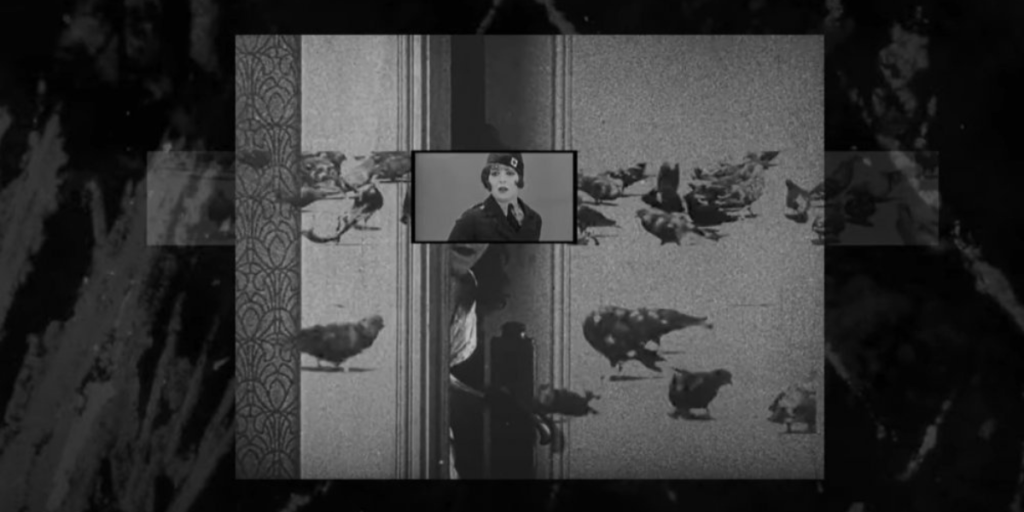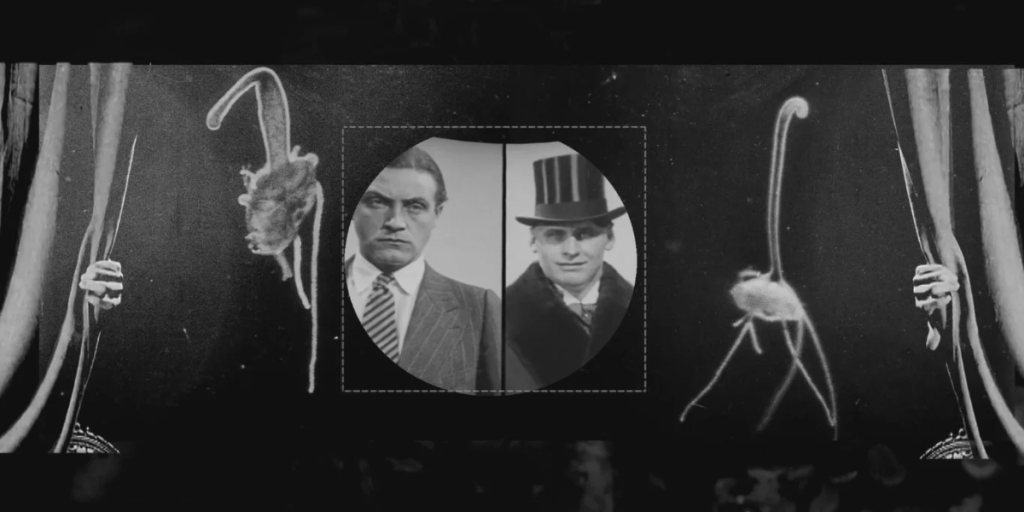Agatha Christie Screen Spotlight: Experimental Hungarian Film ‘The Mysterious Affair at Styles’

Just how flexible are Agatha Christie’s mystery stories and her famous detective creation Hercule Poirot? Hungarian filmmaker Péter Lichter tests those boundaries in his 2022 experimental film The Mysterious Affair at Styles, based on Christie’s 1920 debut Poirot novel.
Running a little over an hour, Lichter’s film is a visual collage constructed entirely out of clips from other films, mostly from the silent and early sound periods, as well as from a handful of rudimentary video games. It’s easily the most unconventional Poirot adaptation ever made, but it also offers a surprisingly straightforward recounting of Christie’s story.
Narrated in first person by actor Pál Mácsai as Poirot, The Mysterious Affair at Styles is almost like an illustrated audiobook, with images that sometimes match up directly with what Mácsai is saying, and sometimes offer only abstract representations of the plot and characters. The movie opens with a film strip showing frames of Albert Finney as Poirot in 1974’s Murder on the Orient Express, but the clips generally don’t draw from other Christie adaptations, instead interpolating iconic silent-era classics like Fritz Lang’s Metropolis, Buster Keaton’s Sherlock Jr. and first-ever Best Picture Oscar winner Wings.

That Finney film strip returns for subsequent chapter headings, looking more distorted and degraded each time. “Who is able to follow this whole story?” Poirot asks at one point, but the story that Lichter presents is a fairly faithful adaptation of Christie’s novel, and is no more difficult to understand than any of her other twist-filled tales. Mácsai’s narration comes in the form of the classic Poirot reveal, as he recounts the facts of the case to all of the potential suspects, who are presumably gathered in front of him. Mácsai even performs the other characters’ dialogue when Poirot is describing past conversations he heard or was told about.
Lichter makes Poirot a more intimate participant in the case, as a close friend of the victim, wealthy widow Emily Inglethorp. While in the novel it’s Poirot’s associate Hastings who’s staying at the lavish Styles Court when Emily is murdered, Lichter eliminates Hastings from the story and has Poirot staying with the family when the murder occurs. Poirot begins by talking about his own status as a refugee, and there’s a haunted quality to Mácsai’s delivery that rarely arises in other portrayals of Poirot.

Even Poirot’s vaunted deductive skills are placed into question when he expresses his opinion that what’s most important about being a detective is not finding the killer or getting to the truth, but rather acquitting the innocent. It’s not uncommon for Poirot’s cases to involve false accusations against innocent parties before arriving at the true culprit, but this version of Poirot seems tormented by the idea that someone might suffer such accusations unjustly. Perhaps his unspecified status as a refugee, connected to the novel’s World War I setting, has made him especially sensitive to such injustice.
Since we never see any direct visual representation of Poirot’s actions, Mácsai’s voiceover carries all of the characterization, sometimes in contrast to clips of lively or bizarre antics. Even as Lichter’s images, which often overlap or play out in split-screen boxes, can be disorienting, Mácsai offers a somber fortitude in his narration.

In that way, The Mysterious Affair at Styles (which is available to stream on YouTube) fits perfectly within the spectrum of Poirot adaptations. No matter how he’s depicted (or not depicted) onscreen, Poirot always has a strong sense of right and wrong, and he always keeps his focus on what’s right. He’s flexible enough as a character to fit into an enormous range of stylistic approaches, but as a person, he retains his essential moral clarity.
By clicking 'Sign Up,' I acknowledge that I have read and agree to Hachette Book Group’s Privacy Policy and Terms of Use
What to Read Next
Josh Bell is a freelance writer and movie/TV critic based in Las Vegas. He has written about movies, TV, and pop culture for Vulture, IndieWire, Tom’s Guide, Inverse, Crooked Marquee, and more. With comedian Jason Harris, he co-hosts the podcast Awesome Movie Year


